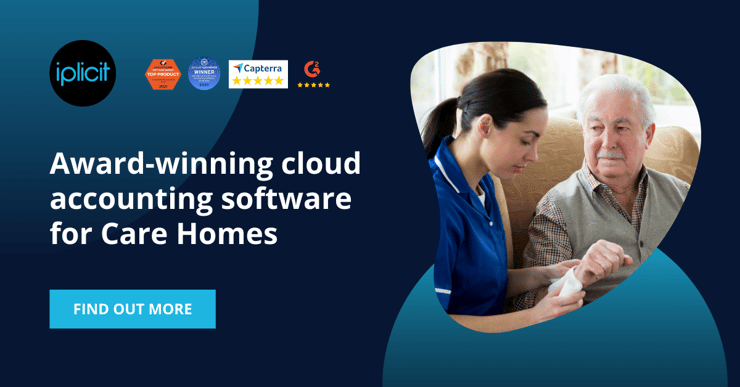Moves to adopt more digital record keeping in care homes could backfire if finance departments are left out of the process, iplicit has warned.
The government wants to see patient care record systems digitised by March 2024 at 80% of homes which are registered with the Care Quality Commission.
But the potential improvements in efficiency could be undermined if finance is not part of the digital transformation – while hard-pressed staff could be left to struggle with inadequate accounting systems.

Complexity in care home finances
Care homes are increasingly consolidating into groups in order to remain viable as costs rise and regulation increases.
But that consolidation can add to the complexity of dealing with their finances.
Tim Bryars, Care Home Lead at iplicit, says: “Care home groups commonly consist of multiple homes which have been set up as separate legal entities. Often, each will have its own accounting system, or separate installations of the same software, and each will have its own procedures for invoicing and payment runs.
“On top of that, one resident can be funded from several sources, such as the NHS, an insurer and relatives. Bills come in that relate to multiple residents, or that need to be split between different legal entities.
“That can make the work of compiling the group accounts incredibly complicated, with finance teams hunting down records and working out figures in spreadsheets.
“Despite long hours and hard work across the team, a great deal of information can exist in silos, hidden from the people trying to assemble a complete financial picture of the business.
“That means decision makers only receive full accounts after a laborious month-end process which often takes so long that the information is already out of date.”
The need to scale
“The UK is facing the challenge of an ageing population. The number of people aged 85 and over is expected to reach 3.2m by 2041, twice the figure from 2016,” says Tim.
“Care home businesses will need to be scalable if the industry is to stand any chance of addressing the extra demand – but that will be hard to achieve without greater efficiency in finance teams.”
The government’s target for 80% of all registered care providers to adopt digital care records is intended as a milestone on the path to better integrating health and social care.
“The government may not have set a target affecting the finance team directly, but digital transformation really needs to include finance,” said Tim.
“Not only will care home groups miss an opportunity if they leave finance out of the process, but they could undermine any efficiency gains they make. If staff are left to contend with an outdated and inadequate finance system, that could cancel out many of the benefits of digital transformation and leave employees overworked and exasperated.”
How better accounting software can help care home groups
Many of the complexities that beset care home finance teams can be drastically simplified by cloud-based accounting software.
Finance teams can see the figures for all care homes in the group through a single login on a central system.
Bank reconciliation can be handled automatically, shrinking the work of many hours into moments.
“Resident accounts” can be created to simplify the business of accounting for multiple sponsors for one service user.
The amount of information that needs to be rekeyed from one system to another is drastically reduced, saving time and reducing scope for error and fraud.
Intercompany allocation features allow bills and payments to be correctly split and assigned to the right parts of the business.
Cost control is much easier because managers have a clearer view on spending.
Tasks such as handling invoices, approving workflows and authorising expenses can be dealt with simply online, on any device.
The finance system can be easily integrated with other business systems, including the widely-used EpicCare and Fusion Care Home Management software.
How finance software benefits the whole business
Care home groups can find it hard to contemplate investment in ‘back office’ functions such as finance when care needs are so acute. But improving efficiency benefits everyone.
“Working life becomes massively more efficient for the whole business when one modern finance system offers a single source of truth, instead of having disparate systems existing across a group of care homes,” said Tim.
“Better accounting software saves large amounts of staff time, freeing up resources to the benefit of the whole business.
“And if leaders are armed with accurate, real-time financial data, they are able to make the judgements that ensure the best possible frontline care – which, of course, should be what drives the whole business.”
Find out more
To find out more about how iplicit helps the care home sector, take a quick tour of the software or book a demonstration of our award-winning cloud accounting software.


